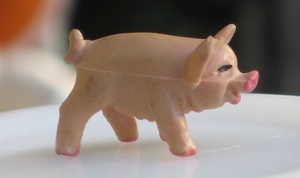It is difficult to talk about daily life without a sense of ourselves being the prey that Wall Street and the biggest corporations bred and held in captivity just like the rabbits of San Juan Island. The San Juan rabbits were originally introduced to the island for hunting, were at some point simply abandoned into the wild, and now have bred a little too successfully, which is a problem. They have few natural enemies other than Man, so Man seems justified in getting really nasty in its methods to get the little guys. I don’t want to dwell on those methods, because the sadness of rabbit death is a distraction from the other issues I should be focusing on.
We’re a rich nation. In order to participate in the social interaction present on the internet, interactive TV and movies, the viewer needs at least one of the expensive devices on which to watch, listen, post messages, click on opinion polls, vote for a favorite, etc. There are so many customers of new and wonderful products that the media treats these things as if everyone has them. Consumers thus are conditioned and bred to have heightened appetites for exciting goods and services. Even poor kids at Christmas want the best of computer games, XBox, Wii, MP3 players and the like, because they are well informed about such items and have been accustomed to think the average person should naturally have them — even when parents are unemployed or facing financial problems. That’s not the kids’ fault; it’s a rare child who fully grasps the financial circumstances of his family, and plenty of parents try to prevent their kids’ knowing how bad things are. The parents may go out begging from the public to try to meet their kids’ desires; generous people often help, by giving them some of those very expensive toys; the sad cycle continues. Those families are now being bred for the hunt. And that’s an extreme example. A lot of us are San Juan stock already, due to our wish to —
1. own a home and taking out too much credit, being deceived by our lenders, cheated by our lenders, or
2. own a smartphone, or
3. own a computer tablet or one of the other wonderful devices which have now actually become a standard device for communicating, working, and the like. Yep, we’re rabbits on the run. Those devices alone, which we have learned to depend upon, incur more and more expense to keep running, to update, and so on. And don’t get me started about cable TV and how much it costs and how TV used to be free…
***************************
And now, I want to say a word about a growing contagion:
The Big Banks have infected the supposedly “Good” Banks with their insidious fee practices. No bank is good anymore.
The HuffingtonPost and some other public-interest groups compiled a list of banks they considered relatively “good,” all over the nation. These banks had little or no exposure to the mortgage crisis, did not invest heavily in the biggest perpetrators of mortgage schemes, etc. The list included small and local banks in every state they could find, and the aim was to find safe and suitable places for middle class people to do their banking.
Banks on this list are now participating in the egregious fees practices that the Big Banks do. For instance, at one unnamed bank, the new overdraft policies categorize consumer purchases in different ways, and by doing so, manage to charge fees on what the new federal legislation would otherwise prohibit charging a fee on.
The legislation says, generally, that each customer of the bank must be asked if he wants any purchase covered if it’s made without sufficient funds in the account. This is “opting in” to an overdraft — so if you try to use your check card in a store to buy an item, but your bank account doesn’t actually have enough, the purchase will go through but your bank will charge you a whopping fee, usually at least $25 and more often $35 or more. This overdraft protects you from inconvenience or embarrassment, but it’s terribly expensive.
If you do not tell your bank you want such protection, it will not cover the charge; your purchase simply gets declined, and nothing more happens. EXCEPT WHEN something more happens. Because they can categorize your purchases in different ways. Buying something in a store or online is considered a Point-of-Sale (POS) purchase, which requires your presence at the store, or your online confirmation of the purchase at the time it is being done. Well, there is another type of purchase, very, very common online: It’s the Recurring Charge. The subscription to an online magazine, or a dating membership, or movie service are all examples of this. This may be called something other than a POS charge by your bank, and they don’t have to decline, even when you didn’t opt in for overdrafts. They treat it as a special kind of purchase, as if it were a promissory note. Car payments and mortgage payments are often recurring charges and are important to cover. But a magazine subscription?? And it incurs fees when your account doesn’t have the money to cover it right there — Boy, does it incur fees.
Now, the fees. The bank in my example charges $36 for the first insufficient funds penalty. Then, if you don’t add some money to your account to take care of it, in a week you are charged another $36. Then soon, if you still haven’t covered it, you get charged $9 a day, every day you don’t add money to your account. A Netflix charge could cost you about $150 that month, if you forgot to make sure your account was completely funded.
Nice one, banks! How we appreciate everything you do!




